英语第三次月考试卷
七年级英语第三次月考试卷及答案
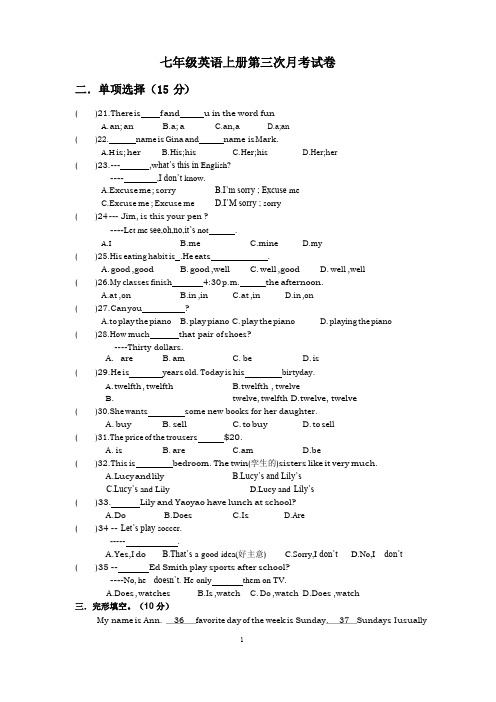
七年级英语上册第三次月考试卷二.单项选择(15 分)( )21.There is f and u in the word funA.a n; anB.a; aC.an,aD.a;an( )22. name is Gina and name is M ark.A.H is; herB.His;hisC.Her;hisD.Her;her( )23.--- ,w hat’s this in English?---- ,I don’t know.A.Excuse me ; sorryB.I’m sorry ; Excuse meC.Excuse me ; Excuse meD.I’M sorry ; sorry( )24 --- Jim, is this your pen ?----Let me see,oh,no,it’s not .A.IB.meC.mineD.my( )25.His eating habit is .He eats .A. good ,goodB. good ,wellC. well ,goodD. well ,well( )26.My classes finish 4:30 p.m. the afternoon.A.at ,onB.in ,inC.at ,inD.in ,on( )27.Can y ou ?A.to play the pianoB. play pianoC. play the pianoD. playing the piano( )28.How much that pair of shoes?----Thirty dollars.A.areB. amC. beD. is( )29.He is years old. Today is his birtyday.A.t welfth , twelfthB.twelfth , twelveB.twelve, twelfth D.twelve, twelve( )30.She wants some new books for her daughter.A. buyB. sellC. to buyD. to sell( )31.The price of the trousers $20.A. isB. areC.amD.be( )32.This is bedroom. The twin(孪生的)sisters like it very much.A.Lucy a nd l ilyB.Lucy’s and Lily’sC.Lucy’s and LilyD.Lucy and Lily’s( )33. Lily and Yaoyao have lunch at school?A.DoB.DoesC.IsD.Are( )34 -- Let’s play soccer.----- .A.Yes,I doB.That’s a good idea(好主意)C.Sorry,I don’tD.No,I don’t ( )35 -- Ed Smith play sports after school?----No, he doesn’t. He only them on TV.A.Does , watchesB.Is ,watchC. Do ,watchD.Does ,watch三.完形填空。
人教版英语九年级上册第三次月考试卷(含答案)
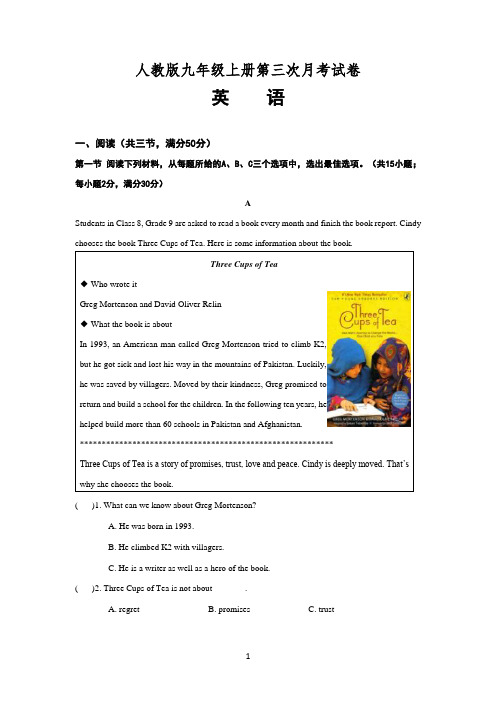
人教版九年级上册第三次月考试卷英语一、阅读(共三节,满分50分)第一节阅读下列材料,从每题所给的A、B、C三个选项中,选出最佳选项。
(共15小题;每小题2分,满分30分)AStudents in Class 8, Grade 9 are asked to read a book every month and finish the book report. Cindy chooses the book Three Cups of Tea. Here is some information about the book.Three Cups of Tea◆ Who wrote itGreg Mortenson and David Oliver Relin◆ What the book is aboutIn 1993, an American man called Greg Mortenson tried to climb K2,but he got sick and lost his way in the mountains of Pakistan. Luckily,he was saved by villagers. Moved by their kindness, Greg promised toreturn and build a school for the children. In the following ten years, hehelped build more than 60 schools in Pakistan and Afghanistan.**********************************************************Three Cups of Tea is a story of promises, trust, love and peace. Cindy is deeply moved. That’s why she chooses the book.( )1. What can we know about Greg Mortenson?A. He was born in 1993.B. He climbed K2 with villagers.C. He is a writer as well as a hero of the book.( )2. Three Cups of Tea is not about _______.A. regretB. promisesC. trustBThe China Cartoon & Animation Museum, opening on June 26, covers a building area of over 30,000 square meters. It has more than 20,000 objects collected from China, the United States, France, Japan, the Netherlands, as well as Poland.AddressNo. 375 Baima Lake Road, Binjiang district, Hangzhou, Zhejiang ProvinceOpening hours9:30 a.m. ~ 4:30 p.m., Wednesday to Sunday (No entry after 4:00 p.m.)Open on public holidaysTransportation* Take No.137, 177M, or 522M bus to Tangjiaqiao East. Then walk about 200 meters.* Take No.114, 1503M, or 1507M bus to Changhe. Then walk about 500 meters.* Drive to the P8 parking lot of Baima Lake Scenic Area for free parking. Then walk about 500 meters.NoteThe entry is free, but you need to follow the museum’s WeChat account (CCA Museum) to make a reservation(预约) before visiting. For more information, please call xxxx-xxxxxx( )3. What do we know about the museum?A. It is kind of small.B. It has a long history.C. It is in Hangzhou, Zhejiang.( )4. How can people get to the museum?A. Take the subway to Changhe and then walk there.B. Drive to Baima Lake Scenic Area and then walk there.C. Take Bus 177M to Changhe and then walk there.( )5. In which part of the website can we find the reading?A. History.B. Business.C. Travel.CXu Yuanchong was a Chinese translator(翻译家). He is best known forhis translations of ancient Chinese poems into English and French.Xu’s translation career(生涯) began during his college years when hestudied at the National Southwest Associated University in Kunming. In1939, he translated a poem written by Chinese poet Lin Huiyin titled Don’tCast Away, which is known as his earliest work. In the late 1940s, Xu wentto France to study French literature(文学). Later he returned to China andbegan to work at Peking University.While teaching at Peking University, Xu kept on his translation work. He was the first Chinese to translate Chinese poetry into English and French. For him, translated literature is a beautiful art. He once said, “The greatest joy on the earth is to introduce the beauty created by a people to the whole world.”Xu paid much attention to the beauty of language. He would leave something out and add something to make the translated works more beautiful. But other translators thought that made his translation a bit different from the meaning of the source text(原作). Xu had many debates(辩论) with them. He said, “I’m not afraid, because the truth becomes clearer with each debate.”Over the years, Xu’s beautiful translation works have acted as a cultural bridge connecting the East with the West, English- and French-speaking readers are able to better understand Chinese literature through Xu’s tran slations. At the same time, Chinese readers can enjoy foreign works in the same way as they read works written in Chinese.( )6. Xu’s translation career started _______.A. when he studied in KunmingB. when he was studying in FranceC. after he came back from France( )7. The underlined sentence tells us that _______.A. Xu wanted to let others enjoy beautyB. Xu had a lot of fun translating worksC. Xu showed great interest in literature( )8. Xu often debated with other translators because _______.A. he wanted them to pay attention to beautyB. they didn’t think he was the best translatorC. they didn’t agree with Xu about his translation ideas( )9. The last paragraph mainly talks about _______.A. the opinions of English readers on Xu’s worksB. the influence of Xu’s works on Chinese readersC. the meaning of Xu’s works in connecting different cultures( )10. Which is the best title for the passage?A. The beauty of languageB. Xu Yuanchong, a great translatorC. Translated literature, a beautiful artDMany of us have this experience: a piece of music keeps playing inour heads when we are awake. It turns out this can happen during sleep aswell. And it can cause problems in getting to sleep and staying asleep.“Our brains continue to process music even when none is playing,including while we are asleep,” said the neuroscientist(神经科学家)Michael Scullin. His research team surveyed(调查) 199 people and madea sleep test on 50 volunteers. They wanted to find out how listening to music, especially listening to earworms(洗脑音乐), before bedtime influenced our sleep.In the survey, people who listened to music during the day were more likely to report nighttime earworms. That then had a bad influence on their sleep quality(质量) through the night.For the lab test, volunteers were played several earworms and then their sleep quality was tested. Earworms were reported throughout the night. They needed longer time to fall asleep and woke up more times during the night.We thought that people would have earworms at bedtime when they were trying to fall asleep, but we certainly didn’t know people would regularly(经常地) wake up from sleep with an earworm,” says Micha el, “But we saw that in both the survey and the test.”People used to believe that listening to music could help them have a better sleep, because it can relax the body. But Michael and his team suggested that it might be worse for our sleep — that even after the music stops, our brains continue to process it for several hours.Michael suggested avoiding listening to music right before bed to limit the chance of a song taking hold in our minds. “Doing some other activities, like making a list of jobs for th e next day, might help clear the mind,” Michael said.( )11. Michael and his team did the research to find out _______.A. the influence of earworms on our sleepB. why nighttime earworms happenC. the influence of bad sleep on our health( )12. What was the new discovery about listening to earworms in the research?A. It would make people stay up late.B. It would make people have earworms at bedtime.C. It would make people wake up more often at night.( )13. The underlined word “limit” has the closest meaning to “_______”.A. controlB. increaseC. share( )14. What can we infer from the last two paragraphs?A. Listening to music before going to bed is good for health.B. People can do some sports to relax the body before sleeping.C. The more we listen to music, the worse sleep we may have.( )15. What’s the purpose of the passage?A. To help readers improve sleep quality.B. To tell readers about the recent research.C. To ask readers to stop listening to music.第二节阅读下面短文内容,从短文后的选项中选出能填入空白处的最佳选项。
湖南省湖南师范大学附属中学2023-2024学年高三上学期第三次月考英语试题
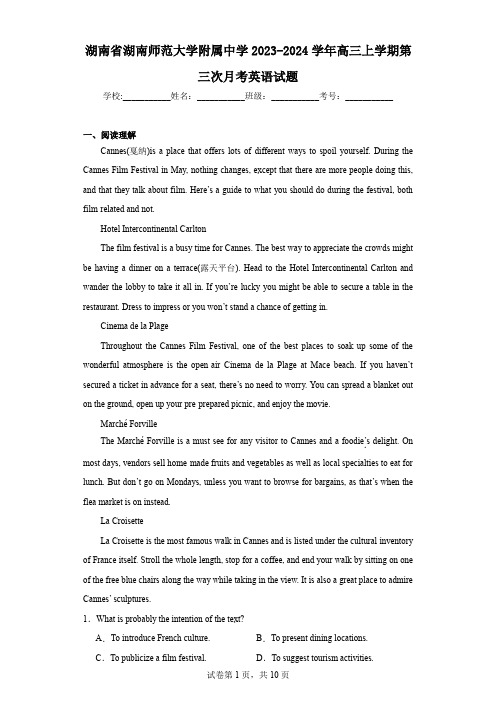
湖南省湖南师范大学附属中学2023-2024学年高三上学期第三次月考英语试题学校:___________姓名:___________班级:___________考号:___________一、阅读理解Cannes(戛纳)is a place that offers lots of different ways to spoil yourself. During the Cannes Film Festival in May, nothing changes, except that there are more people doing this, and that they talk about film. Here’s a guide to what you should do during the festival, both film-related and not.Hotel Intercontinental CarltonThe film festival is a busy time for Cannes. The best way to appreciate the crowds might be having a dinner on a terrace(露天平台). Head to the Hotel Intercontinental Carlton and wander the lobby to take it all in. If you’re lucky you might be able to secure a table in the restaurant. Dress to impress or you won’t stand a chance of getting in.Cinema de la PlageThroughout the Cannes Film Festival, one of the best places to soak up some of the wonderful atmosphere is the open-air Cinema de la Plage at Mace beach. If you haven’t secured a ticket in advance for a seat, there’s no need to worry. You can spread a blanket out on the ground, open up your pre-prepared picnic, and enjoy the movie.Marché ForvilleThe Marché Forville is a must-see for any visitor to Cannes and a foodie’.s delight. On most days, vendors sell home-made fruits and vegetables as well as local specialties to eat for lunch. But don’t go on Mondays, unless you want to browse for bargains, as that’s when the flea market is on instead.La CroisetteLa Croisette is the most famous walk in Cannes and is listed under the cultural inventory of France itself. Stroll the whole length, stop for a coffee, and end your walk by sitting on one of the free blue chairs along the way while taking in the view. It is also a great place to admire Cannes’ sculptures.1.What is probably the intention of the text?A.To introduce French culture.B.To present dining locations.C.To publicize a film festival.D.To suggest tourism activities.2.Which place best suits people who enjoy shopping?A.Hotel Intercontinental Carlton.B.Cinema de la Plage.C.Marché Forville.D.La Croisette.3.What can be expected in Cannes during the festival?A.Attending fashion shows.B.Watching movies outdoors.C.Tasting imported farm produce.D.Experiencing sculpture production.Coming into the freshman year at Paul College, Sansa was concerned about her ability as an individual to make an impact on such a large community, for it was never hard for her to stand out from peers in high school. Luckily, each first-year student in Paul College takes part in what is called the First-year Innovation and Research Experience, commonly referred to as the FIRE Program, an extracurricular project assigned by the institution. She was able to forge invaluable connections with her fellow students and their peer advisor who had so much first-hand experience with what they all were going through.The biggest highlight of her freshman year was working alongside her FIRE team on a Grand Challenge Project, in which every FIRE team competed against one another in the Undergraduate Research Conference. Each team had to create a unique product that tackled one of the five following real-world problems: “Water is Life”, “Food”, “Threats from Cyberspace”, “Medical Breakthroughs”, and “Addictive Society”. Her team addressed the growing issue of “Addictive Society”. Doing research, collecting facts and organizing discussions or even debates were a huge amount of work before they went to vie with other teams.After weeks of tireless preparation, their collective efforts bore fruit at the Undergraduate Research Conference. They earned a spot in the final round of the conference, where they competed against the top team from each of the other Grand Challenge groups. They were so overcome with pride when they were finally announced as the overall first-place team at the college!If it hadn’t been for her group’s determination, excellent teamwork and their awesome peer advisor Hayley, they would not have been able to accomplish everything they did. This experience would be instrumental in her future.4.What do we know about Sansa from paragraph 1?A.She performed quite well in high school.B.She was much more experienced than her college schoolmates.C.She applied for the FIRE Program.D.She had trouble with her freshman year.5.How did each team compete against one another?A.By providing facts.B.By creating products.C.By organizing debates.D.By challenging each other.6.What does the underlined phrase “vie with” in paragraph 2 probably mean?A.Contest against.B.Give way to.C.Break up with.D.Make up with.7.What is probably Sansa’s biggest gain from the FIRE Program?A.Financial benefits.B.Academic reputation.C.Good relationships.D.Competitive opponents.When Jason Allen submitted his “Th éâtre D’.opéra Spatial” into the Colorado StateFair’s fine arts competition, the print was an immediate hit, defeating 20 other artists in the “digitally manipulated photography” category to win the first-place blue ribbon and a $ 300 prize.Allen’s piece offers a clear example of how rapidly AI-generated art has advanced. Trained on billions of internet images, the systems have decisively pushed the boundaries of what computers can create.But it has also sparked a massive debate over the meaning of art, with Allen facing accusations that he had been deceiving with something he asked a machine to create.Text-to-image tools like DALL-E 2 and Midjourney have quickly increased in sophistication and have become one of the hottest topics in AI. They can generate not just fake people, objects and locations but mimic entire visual styles.But AI-generated art has been criticized as automated plagiarism (剽窃), because it relies on millions of ingested art pieces that are then parroted (机械地重复) together. It has also fueled deeper fears: blurring the boundaries of reality or interfering with human art.Allen said his art piece shows people need to “get past their denial and fear” of a technology that could give rise to new inventions and reshape our world. “The AI,” he said,“is a tool, just like the paintbrush is a tool. Without the person, there is no creative force.”Jessica Hair, a 25-year-old receptionist at a doctor’s office who won third place in the competition, said she did not feel as if Allen had acted unfairly and had no hard feelings about his win.Hair said her “Judge, Jury, Executioner”, which depicts a tuxedoed skeleton on a golden throne surrounded by skulls, took 15 hours to create with a stylus (触屏笔) on an iPad Pro. But Allen’s piece took time, effort and subjective judgment, too, and “how do we qualify what is and isn’t art?” she said.8.Which of the following statements can be inferred from the text?A.It is the first time in history that an AI-generated work has won an arts competition.B.Advances made in computer art are not as rapid as the public believes them to be.C.Computer-produced works have more success in some art forms than in others.D.People’s acceptance of computer-produced art pieces can vary considerably. 9.According to the text, why is AI-generated art facing severe criticism?A.Because it will ultimately overtake human art in the future.B.Because it will lead to a sharp decrease in human creativity.C.Because it purely uses existing art pieces as its subject matter.D.Because the technical standard of its output is extremely low.10.What was Allen’s reaction to people’s criticism?A.He fought back like a soldier.B.He kept silent like a victim.C.He persuaded like a promoter.D.He lost heart like a failure.11.What is Jessica Hair’s attitude towards Allen’s award-winning piece?A.Supportive.B.Critical.C.Cautious.D.Skeptical.The streets, sidewalks and roofs of cities all absorb heat during the day, making some urban areas across the United States up to 6 degrees Fahrenheit hotter than rural ones during the day—and 22 degrees F hotter at night. These “urban heat islands”can also develop underground as the city heat spreads downward, beneath the surface. And basements, subway tunnels and other underground infrastructure also constantly bleed heat into the surrounding earth, creating hotspots. Now the underground heat is building up as the planet warms.According to a new study of downtown Chicago, underground hotspots may threaten the very same structures that emit the heat in the first place. Such temperature changes make the ground around them expand and contract (收缩) enough to cause potential damage. “Without anyone realizing it, the city of Chicago’s downtown was deforming,” says the study’s author Alessandro F. Rotta Loria, a civil and environmental engineer at Northwestern University.The findings, published in Communications Engineering, expose a “silent hazard (危险)” to civil infrastructure in cities with soft er ground — especially those near water — Rotta Loria says. “There might have been structural issues caused by this underground climate change that happened, and we didn’t even realize,” he adds. While not an immediate or direct danger to human lives, this previously unknown effect highlights the impacts of a lesser-known component of climate change.Similar to climate change above the surface, these underground changes occur over long periods of time. “These effects took decades, a century, to develop,” Rotta Loria says, adding that elevated underground temperatures would likewise take a long time to dissipate (逐渐消失) on their own.But other researchers interviewed for this story all say this wasted energy could also be recycled, presenting an opportunity to both cool the subsurface and save on energy costs. Subway tunnels and basements could be updated with technologies to recapture the heat. For example, water pipes could be installed to run through underground hotspots and pick up some of the heat energy.12.What can we learn about the “urban heat islands”?A.They can develop underground structures.B.They are impacted by global warming.C.They can destroy the ground around.D.They only exist in the United States.13.Why does Alessandro F. Rotta Loria mention “silent hazard” in paragraph 3?A.To discuss structural issues.B.To categorize climate change.C.To explain underground heat.D.To emphasize the neglected reality.14.What will the author probably write about in the paragraph that follows?A.The future of tunnels and basements.B.The reusing approaches of heat energy.C.The cost of maintaining structures.D.The evolution of underground environment.15.Which of the following can be the best title for the text?A.Warming Underground, Weakening SurfaceB.A Silver Lining of Global WarmingC.Urban Silent Islands in the MakingD.A Silent Crisis in Downtown Chicago二、七选五Including children in the farming lifestyle has many benefits. Sure, it is nice to have the additional help with chores, but it also fosters so much growth, sending our kids down a good path towards who they will someday become. It is possible that our children will grow up to lead lives that do not include farming. 16Through caring for farm animals, kids learn that in life others often come before self.17 It doesn’t matter if we don’t feel like it or if we are sick and tired. What matters is that we take care of the animals that take care of us and do so in a timely manner.18 If the work on a farm does not get done, the operation fails. It takes discipline and commitment to get down to business every day, and seeing this in action will give kids a good work attitude. They will know and understand that nothing good comes easy and that they have to work to survive. 19 Functioning as part of a productive team will surely be playing a crucial role sooner or later in all walks of life.Additionally, farming teaches patience. 20 It’s especially true for the animals. Cattle will be difficult to control. Horses will run away when you try to catch them. Goats will kick over that bucket of hard-earned milk. A rooster will decide you got too close to his hens and give you a run for your money. In spite of all that, kids will learn to be patient and take things easy.There may not be any instant reward, but in the long-term kids will see the benefit of all their efforts during those hard days.A.Fairly often, things do not go your way.B.Kids also learn to be grateful to animals.C.In the meantime, they learn to work with others.D.Teamwork is no longer a significant skill to develop and use.E.Animals need to be fed and cared for before we get to sit down and relax.F.Kids are also able to comprehend the value of hard work through farm life.G.What they learn on a farm, however, can be instrumental in their future lives.三、完形填空27.A.could B.should C.would D.might 28.A.also B.again C.only D.instead 29.A.responded B.claimed C.updated D.expressed 30.A.odd B.general C.novel D.complicated 31.A.closed B.black C.plain D.blank 32.A.lesson B.blame C.curse D.ban 33.A.open B.click C.use D.function 34.A.refreshing B.crashing C.connecting D.running 35.A.advocate B.tolerate C.appreciate D.understand四、用单词的适当形式完成短文阅读下面短文,在空白处填入1个适当的单词或括号内单词的正确形式。
七年级英语第三次月考测试卷
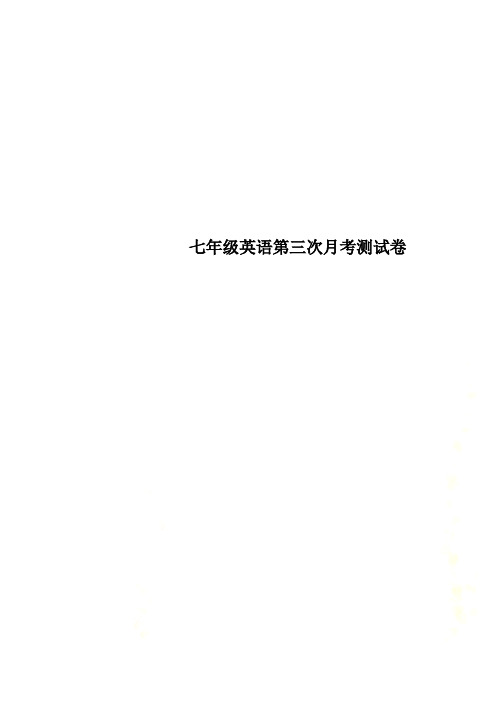
七年级英语第三次月考测试卷七年级英语第三次月考试卷时间:120分钟满分:120分出卷人:吴娟Ⅰ.单项选择。
(30分)( )1. --- is your jacket ? --- It’s green.A. What’s; aB. What color; aC. What color; /D. What’s color; /( ) 2. ---What’s this? --- It’s orange.A. aB. anC. /D. the( ) 3. --- is it? --- It’s letter (字母) Y .A. What’sB. HowC. WhatD. What color( ) 4. This is ruler. ruler is yellow.A. the; aB. a; AC. A; theD. a; The( ) 5. ---What is this English? --- It’s a map.A. onB. inC. forD. at( ) 6.How __ you, Eric?A. amB. isC. areD. be( ) 7. ___ this in English?A. WhatB. What’sC. HowD. How’s( ) 8. — Spell it, please. — OK,A. It’s a ruler.B. R–U–L–E–R.C.It’s yellow.( ) 9. —— Helen.A. What’s your name?B. What’s this?C.How are you?( ) 10. — Nice to meet you, Eric! —A. Nice to meet you, tooB. How do you do?C. Goodafternoon.( ) 11. His name is Jim Smith. Smith is hisname.A. EnglishB. firstC. last( ) 12. — Is this your key? —A. Yes, it’s.B. No, it isn’t.C.No, it is.( ) 13. That my mother. These mybrothers.A. is, areB. am, areC. are, is( )27.On weekends we like to hang out with friends.A. weB. usC. our( )28.Can you find clock on the desk?A. aB. anC. /( )29.Thanks your photos.A. onB. ofC. for( )30. Steven. phone number is 2349879.A. My is;IB. I am;MyC. I am;III完形填空。
人教版九年级上册第三次月考试卷(含答案)

人教版九年级上册第三次月考试卷英语I.听力(共两节,满分20分)第一节(共5小题,每小题1分,满分5分)听下面5段对话。
每段对话后有一个小题,从题中所给的A, B, C三个选项中选出最佳选项。
1. What can’t be used at Tony’s school?A. E-dictionary.B. Mobile phones.C. MP6 players.2. What is the boy allowed to do on Sunday morning?A. To play the piano.B. To do some reading.C. To play computer games.3. How long haven’t they seen each other?A. For two years.B. For three years.C. For four years.4. Who didn’t go out on vacation?A. John.B. Tina.C. Tina’s parents.5. Whose guitar is this?A. Jane’s.B. Mary’s.C. Jenny’s.第二节(共15小题,每小题1分,满分15分)听下面6段对话或独白。
每段对话或独白后有几个小题,从题中所给的A, B, C三个选项中选出最佳选项。
听第六段对话,回答第6、7小题。
6. What kind of music does the man like best?A. The music that he can sing along with.B. The music that he can dance to.C. The music that has great lyrics.7. What kind of instrument can the man play well?A. The guitar.B. The drums.C. The erhu.听第七段对话,回答第8、9小题。
人教版九年级英语上册第三次月考(含答案)
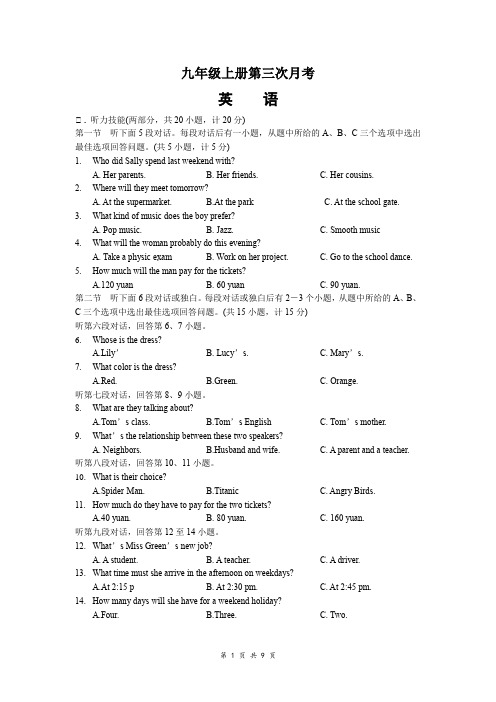
九年级上册第三次月考英语Ⅰ . 听力技能(两部分,共20小题,计20分)第一节听下面5段对话。
每段对话后有一小题,从题中所给的A、B、C三个选项中选出最佳选项回答问题。
(共5小题,计5分)1.Who did Sally spend last weekend with?A. Her parents.B. Her friends.C. Her cousins.2.Where will they meet tomorrow?A. At the supermarket.B.At the parkC. At the school gate.3. What kind of music does the boy prefer?A. Pop music.B. Jazz.C. Smooth music4.What will the woman probably do this evening?A. Take a physic examB. Work on her project.C. Go to the school dance.5.How much will the man pay for the tickets?A.120 yuanB. 60 yuanC. 90 yuan.第二节听下面6段对话或独白。
每段对话或独白后有2-3个小题,从题中所给的A、B、C三个选项中选出最佳选项回答问题。
(共15小题,计15分)听第六段对话,回答第6、7小题。
6.Whose is the dress?A.Lily’B. Lucy’s.C. Mary’s.7.What color is the dress?A.Red.B.Green.C. Orange.听第七段对话,回答第8、9小题。
8.What are they talking about?A.Tom’s class.B.Tom’s EnglishC. Tom’s mother.9.What’s the relationship between these two speakers?A. Neighbors.B.Husband and wife.C. A parent and a teacher.听第八段对话,回答第10、11小题。
六年级上册英语试题-第三次月考试卷 人教(pep)(含答案)

六年级上学期英语第三次月考试卷(含答案)一、选择正确的单词填空,完成句子。
(10分)1.He ________(like/likes)going hiking.2.________(Do/Does)she go to school by bus?3.She ________ (work/works) in a school.4.I'm going to ________(read/reads)a word book.5.Robin ________(teach/teach es)students to make robots.二、选择正确的答案,将其序号填入题前括号里。
(10分)6.—Does he li ve in China?—________.A. Yes, he doesB. No, she doesn'tC. Yes, they are7.We meet every Wednesday afternoon ________ 4 o'clock in the dining hall.A. atB. inC. on8.What ________ Sarah like doing?A. doB. doesC. are9.He ________ word puzzles every day.A. doB. isC. does10.I like ________ books. I ________ books every day.A. read; readB. reading; readingC. reading; read三、选择合适的句子补全对话,将其序号填在横线上。
(10分)11.选择合适的句子补全对话,将其序号填在横线上A. He likes drawing cartoons and listening to music.B. What are you doing?C. Yes, he does.D. Can I also be his pen pal?E. Does he live in Shanghai?A: Hey! ________B: I am writing a postcard to my pen pal Peter.A: ________B: No, he doesn't. He lives in Wuhan.A: What are his hobbies?B: ________ He also likes climbing mountains.A: Does he climb mountains every week?B: ________A: I also like climbing mountains. ________B: Of course.四、选择合适的单词或短语将短文补充完整,每词限用一次。
滁州市第六中学八年级下学期第三次月考英语试卷
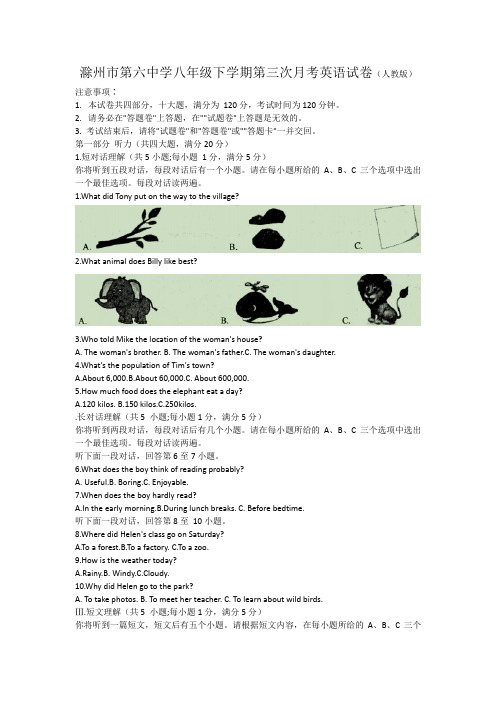
滁州市第六中学八年级下学期第三次月考英语试卷(人教版)注意事项∶1.本试卷共四部分,十大题,满分为120分,考试时间为120分钟。
2.请务必在"答题卷"上答题,在""试题卷"上答题是无效的。
3. 考试结束后,请将"试题卷"和"答题卷"或""答题卡"一并交回。
第一部分听力(共四大题,满分20分)1.短对话理解(共5小题;每小题1分,满分5分)你将听到五段对话,每段对话后有一个小题。
请在每小题所给的A、B、C三个选项中选出一个最佳选项。
每段对话读两遍。
1.What did Tony put on the way to the village?2.What animal does Billy like best?3.Who told Mike the location of the woman's house?A. The woman's brother.B. The woman's father.C. The woman's daughter.4.What's the population of Tim's town?A.About 6,000.B.About 60,000.C. About 600,000.5.How much food does the elephant eat a day?A.120 kilos.B.150 kilos.C.250kilos..长对话理解(共5 小题;每小题1分,满分5分)你将听到两段对话,每段对话后有几个小题。
请在每小题所给的A、B、C三个选项中选出一个最佳选项。
每段对话读两遍。
听下面一段对话,回答第6至7小题。
6.What does the boy think of reading probably?A. Useful.B. Boring.C. Enjoyable.7.When does the boy hardly read?A.In the early morning.B.During lunch breaks.C. Before bedtime.听下面一段对话,回答第8至10小题。
- 1、下载文档前请自行甄别文档内容的完整性,平台不提供额外的编辑、内容补充、找答案等附加服务。
- 2、"仅部分预览"的文档,不可在线预览部分如存在完整性等问题,可反馈申请退款(可完整预览的文档不适用该条件!)。
- 3、如文档侵犯您的权益,请联系客服反馈,我们会尽快为您处理(人工客服工作时间:9:00-18:30)。
听力部分(20分)1.听录音,选择你所听到的单词或短语( )1 . A. pants B. plants C. parents( )2 . A. soccer B. sale C. sock( )3 . A. short B. shirt C. shoes( )4 . A. what B. white C. which( )5 . A. seven B. pen C. eleven( )6 . A. store B. star C. small( )7 . A. cool B. good C. help( )8 . A. my B. buy C. nine( )9 . A. dollar B. dinner C. color( )10 .A. six B. sixteen C. sixty2. 听句子,选出相应的答语。
( )11. A. Yes, you are B. Yes, we are C. Yes, he is .( )12. A. It’s yours B. It’s an orange C. It’s blue.( )13. A. It’s here B. I’m here C. It’s nice( )14. A. Yes, it is B. All right C. Don’t do it( )15. A. Yes, I do B. No, I don’t C. School.( )16. A. I am 12 B. I think he is very old C. She is a teacher.( )17. A. My name is Ketty B. Her name is Ketty C. Its name is Ketty.( )18. A. Lucy isn’t here B. Lucy is at school C. Lucy is in ( )19. A. I am Sam B. This is Sam C. Sam is a student( )20. A. That is David B. He is David C. This is David.笔试部分(100分)一、选出划线部分读音不同的一项。
(5分)( ) 1. A buy B . by C. only( ) 2. A. store B. all C. sock( ) 3. A. sweater B. sell C. sale( ) 4. A. fat B. salad C. tomato( ). 5. A.. health B. bread C. eat二、单项选择(20分)( )1. —What color is it?—It's _____orange. It's _____orange sweater.A. a; anB. an; anC./;anD. an;/( )2. —_______is the pork?—It's five yuan a kilo.A. How manyB. WhichC. How muchD. What( )3. —Well, Let’s play computer games.—That ________ good.A. areB. soundsC. soundD. is( )4. _________ your brother have a baseball bat?A. DoB. DoesC. AreD. Is( )5. She _________ sports every day. Her mother _________ TV every day.A. plaies; watchesB. plays; watchsC. plays; watchesD. play; watch( ) 6. March is ________ month of the year.A. threeB. the threeC. thirdD. the third( )7.John_____ eggs and bananas _____lunch·A.has;with B.have;for C.has;for D.eat;at ( )8.Tim is a_____ boy and he studies(学习) _____ at school.A.good;well B.good;goodC.well;well D.well;good( )9.My birthday is on May ______A. fifteenB. fiftyC. fifteenthD. fiftieth.( )10.There is some ________ on the table. A.tomato B.egg C.chicken D.banana( )11.---Is this _______ dictionary?----No, it isn't.. It is _______A yours, hisB your , herC you ,hisD your ,hers( )12.Let's_______ basketball.A playsB play, theC playD to play( )13.Thanks________the photo _______your school.A of, forB for ,ofC for, aboutD about, for( )14._____ are these socks ? ---Twenty yuan.A WhatB How oldC How muchD When( )15. We have _____ students.A. fourty-fourB. four-fourtyC. forty-fourD. four-forty( )16. September is _____month of the year.A nineB ninthC the ninthD the nineth( )17.--________is your teacher ? -----He is in the classroom.A WhenB HowC WhereD What( )18.---______David and Jane like bananas? ---Yes ,___________.A. Do, he doesB. Do , they do C .Does , he does D . Do , they don't( ) 19. — Do you have two ________? — Yes, I do.A. ping-pongs batB. ping-pong batC. ping-pong batsD. ping-pongs bats( ) 20. ---How much ______ the T-shirt and bag? --- ________ 46 dollars.A.is;It’s B. is; They is C. are; They are D. are; They do三、根据首字母填空。
(10分)1. J________ is the first month of a year.2. I have hamburgers for b___________.3. She eats h________ food every day.4. Mary has three (棒球)5. My father likes (草莓)for lunch.6. Mike doesn’t like math. He thinks it’s d_______.7. The store s_____ school things to us.8. Children should (应当) eat lots of (许多)___________.(蔬菜)9. Zhou Jielun is a singing ________.(明星)10.The shirt is too big for me. Give me a s________ one, please.四.用所给词的适当形式填空。
(10分)1. My friend likes ________(eat) ice-cream.2. Do you want _________ (play ) ping-pong? --- Yes, let’s go.3. The girl ______ (watch) TV at home every day.4. This is _______ (I)pen , and that blue ruler is _____ (I) ,too.5. Please help ______ (he)with his English.6. Your shirt _____ (look) nice . ---- Thank you.7.Today is December ______ (twenty).8. A_____ is my favorite(最喜欢的) month , because I can swim .9. Mary _____ (have) three yellow bags ,and she loves _____ (it) very much.五、选择方框中的句子补全对话,有一项是多余的。
(10分)Clerk: 67Mary: 68 . I want a sweater for school.Clerk: 69Mary: Orange.Clerk: Here you are.Mary: 70Clerk: 20 dollars.Mary: 71 .Clerk: You are welcome.A. Can I help you?B.What would you like?C.What color do you want?D.How much is it?E.Yes,please.F.I’ll take it. Thank you.补全对话,答案写在题后的横线上。
(10分)Jack: Can I (1)_______ (2)___________?Rose: Yes, please. I want some football socks.Jack: (3)______ (4)_______do you want?Rose: White. How much(5)_______ (6)_______?Jack: Ten yuan .Rose: I will take (7)_________.Jack: (8)________you(9)_____________.Rose: (10)_________you very much.Jack: You are welcome.四、句型转换:按括号内的要求改写下列句子。
